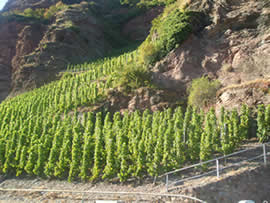 |
| A rocky vineyard in Mosel |
“The idea is romantic and highly useful commercially, but it is scientifically untenable,” wrote Alex Maltman, a professor at the Institute of Geography and Earth Sciences at Aberystwyth University. He presented a paper on ‘the Relationship of Geology, Soils, Hydrology and Climate to Wine’ in one of the sessions, reports NY Times.
Maltman, who is writing a book on geology and wine which will address what he calls the misunderstandings, wrote that while there is no question that vines absorb minerals from the soil, the amounts are far below the human taste threshold. “Whatever ‘minerality’ in wine is, it is not the taste of vineyard minerals,” he wrote.
Jonathan Swinchatt, a Harvard and Yale trained geologist who consults to several wineries in Napa and Sonoma, wrote that “while a direct link between appears to be largely metaphoric,” there are several indirect influences that might account for the notion — such as soil temperature, drainage and trace element chemistry.
“The experiments that might unravel these links are devilishly complex and, for the most part, prohibitively expensive,” said Swinchatt. “As a result, it is likely that the connections between geology and wine will remain elusive for some time to come.”
Swinchatt is the coauthor of the book "The Winemaker's Dance," who has documented scientific differences in vineyard sites and is taking a reasoned look at the topic. His thinking is that the soil differences matter, but we know very little about why, at this point.
Admittedly this isn't entirely new territory. A couple years ago Daniel Patterson and scientist Harold McGee discussed the same subject and came to a similar conclusion: We don't taste the rocks that the vines are grown in, but we might taste what we perceive as rocks.
Maltman's stance is close to what a lot of wine experts think- that mineral character can be found in wine, but wine grown in clay doesn't necessarily taste like clay. Wine grown on limestone may have unique characteristics, but it doesn't have to taste like limestone.
|